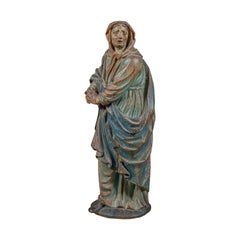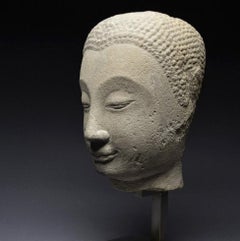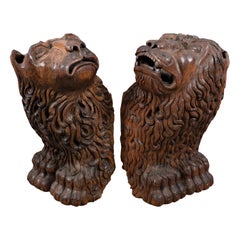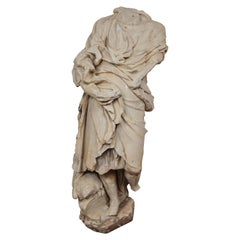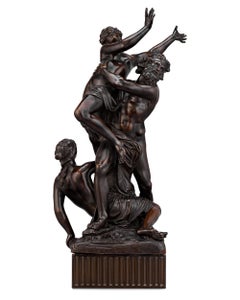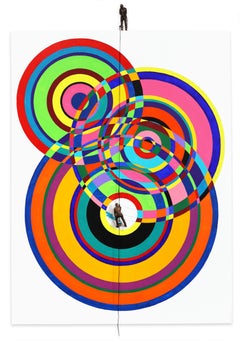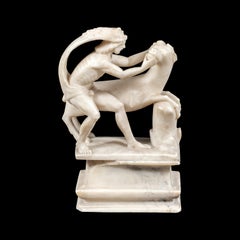17th Century Figurative Sculptures
to
8
11
1
9
3
Overall Width
to
Overall Height
to
175
582
2,196
7,446
71
43
109
116
60
125
204
173
218
270
60
3
19
13
13
10
8
7
5
3
3
2
2
2
2
2
1
1
1
1
1
1
9
8
5
4
3
1
16
8
Period: 17th Century
Baroque Italian master - 17/18th century figure sculpture - The Virgin
Located in Varmo, IT
Carved and painted wooden sculpture - Madonna in Prayer - Italy, 17th-18th century.
25 x 20 x 65 cm.
Made entirely of carved, lacquered, and painted wood. Some signs of wear and pa...
Category
Baroque 17th Century Figurative Sculptures
Materials
Wood, Paint
$2,387 Sale Price
33% Off
Baroque Roman sculptor - 17th century bronze sculpture - Mars Warrior
Located in Varmo, IT
Gilded bronze sculpture - Mars, god of War. Rome, 17th century.
9 x 9 x h 31 cm.
Entirely in cast, chiseled and gilded bronze, resting on an ebonized wooden pedestal decorated with...
Category
Baroque 17th Century Figurative Sculptures
Materials
Bronze
$4,178 Sale Price
41% Off
Large 17th century, Sandstone Buddha Head from Thailand, Ayutthaya Kingdom
Located in SANTA FE, NM
Large Sandstone Head of Shakyamuni Buddha
Thailand (formerly Siam), Ayutthaya Kingdom
17th century
16 1/2 inches on stand, 11 1/3 without
Private collection, France.
The face is ...
Category
Other Art Style 17th Century Figurative Sculptures
Materials
Sandstone
Baroque Venetian sculptor - Pair of 17th century lions wood sculptures
Located in Varmo, IT
Pair of bookend sculptures. Venice, 17th century.
15 x 15 x h 29 cm.
Entirely in finely carved wood.
- This item is sold with a certificate of authenticity with legal validity.
-...
Category
Baroque 17th Century Figurative Sculptures
Materials
Wood
$2,148 Sale Price
28% Off
Agnus dei - Puerta de sagrario - Siglo XVII
Located in Sant Celoni, ES
Muy interesante puerta de sagrario de madera tallada y policromada del siglo xvii.
Es de comienzos del barroco, hay la representación del agnus dei con...
Category
Baroque 17th Century Figurative Sculptures
Materials
Wood Panel
$1,145 Sale Price
20% Off
Renaissance Era Marble Figure Fragment
Located in Los Angeles, CA
An extraordinary 17th century, hand-carved, solid Carrara marble, life sized figure fragment on raised base of the same. The subject is swaddled in a luxurious, gathered robe and tun...
Category
Baroque 17th Century Figurative Sculptures
Materials
Marble
Panel in Scagliola Manifattura Carpigiana mid-17th century "St. Michael"
Located in Pistoia, IT
Carpi, mid-17th century, scagliola panel.
The panel, in black and white two-tone, features insertions of polychrome marbled elements and a central scene depicting St. Michael defeat...
Category
Baroque 17th Century Figurative Sculptures
Materials
Slate
Baroque Italian master - 17/18th century figure sculpture - Saint
Located in Varmo, IT
Carved and painted wooden sculpture - Figure of a saint - Italy, 17th-18th century.
36 x 25 x 74 cm.
Made entirely of carved, lacquered, and painted wood. Some signs of wear and pa...
Category
Baroque 17th Century Figurative Sculptures
Materials
Wood, Paint
$2,984 Sale Price
28% Off
Just A Little Tipsy (MADE TO ORDER) (Sabbath, Kiddush, Unique, Gold Luster)
Located in Kansas City, MO
(MADE TO ORDER) (Sabbath, Kiddush, Unique, Gold Luster)
*Lead Time may vary between 1-3 weeks
Melanie Sherman
"Just A Little Tipsy"
Year: 2021
Porcelain, Glaze, ChinaPaint, 24k Germ...
Category
Baroque 17th Century Figurative Sculptures
Materials
Luster, Porcelain, Glaze
Bust of Pope Innocent XI Odescalchi by Domenico Guidi
Located in New Orleans, LA
This monumental bust is a museum-quality example of Roman Baroque sculpture. Crafted by the legendary Domenico Guidi and carved from Carrara marble, the impressive portrait captures the visage of Pope Innocent XI, Benedetto Odescalchi (1611-1689). It presents a larger-than-life example of Guidi’s remarkable skill as a sculptor, which ultimately made his workshop one of the most important in Rome during his age. Today, his works are rarely found on the market, particularly his extraordinary works in marble.
Pope Innocent XI was born Benedetto Odescalchi into an Italian noble family of prominent bankers. Spending his early years in banking, he eventually turned to the law, earning his doctorate in 1639. His background would serve him well in his service to the papacy, and he became known as a frugal and devout member of the Church. In 1676, he was unanimously elected Pop after the death of Clement X. During his nearly 13-year reign, he instilled his own personal ideals of austerity and frugality onto the Church, with a deep commitment to reform and piety.
He is captured here by Guidi in his traditional Pope’s mozzetta and camauro cap. A wide stole is draped over his shoulders, ornamented by acanthus leaves and the coat of arms of the Odescalchi family. It displays Guidi’s mastery over the chiaroscuro effect, particularly in the high level of contrast in his cheeks and his eyes, which Guidi achieved through various methods of high polish.
A very similar portrait sculpture of Pope Innocent XI by Guidi can be found in the collection of the Royal Castle in Warsaw. The Warsaw bust belongs to a series of portraits of popes which the Odescalchi family commissioned from Domenico Guidi in the 1690s. Compared to that example, the present bust is far more dramatic, with deeper cut lines and a more precise expression. It is likely that the present piece was seen by the Odescalchi family, who ordered a similar one to be made. The piece was almost certainly intended to be displayed in a niche, given its dramatic cutting and its roughly carved back.
Others of Guidi’s busts can be found in important collections throughout Italy, England and the United States, though many of these are lesser bronze repetitions. A bronze bust of the Pope Alexander VIII by Guidi is currently in the collection of the Victoria & Albert Museum (London), while a terracotta version of the same is in the Los Angeles County Museum. A bronze of Pope Alexander VIII can be found in the Princely Collection of Lichtenstein, and his impressive marble papal bust of Clement IX graces the pope’s tomb in Santa Maria Maggiore. The present bust of Pope...
Category
Baroque 17th Century Figurative Sculptures
Materials
Marble
Baroque Roman sculptor - 17th century alabaster sculpture - Hercules Cerberus
Located in Varmo, IT
Alabaster sculpture - Hercules and Cerberus. Rome, 17th century.
18 x 9.5 x h 37 cm.
Made entirely of carved alabaster. Separate alabaster base, missing left foot and arm, and othe...
Category
Baroque 17th Century Figurative Sculptures
Materials
Alabaster
Nessus and Deianira Bronze
By Giambologna
Located in New Orleans, LA
A technical and creative masterpiece of the late Renaissance era, this extraordinary bronze figure depicts the famed Greek legend of The Abduction of Deianira. Bringing together the ...
Category
Renaissance 17th Century Figurative Sculptures
Materials
Bronze
A late 17th Italian carved limewood figure of Mermaid, circle of Filippo Parodi
Located in PARIS, FR
A late 17th c. Italian carved figure of Mermaid,
Circle of Filippo Parodi (Genoa, 1630 – July 22, 1702)
Dimensions: h. 29.13 in, w. 30.31 in, p. 18.9 in (at the base)
Magnificent Italian Baroque sculpture depicting a mermaid seated on the rock.
All the virtuosity of the sculptor unfolds in this carved group. The fantastic creature is featured seated, the upper part of the body darting forward, the head looking upwards. Sophisticated hairstyle with rows of pearls intertwined in her hair, her loose locks fly in the wind and bring movement to the whole sculpture.
The wide-open eyes with hollowed-out pupils make it possible to follow the mermaid's gaze, towards the sky. The half-open mouth further magnifies this bewitching and seductive attitude.
Its long double tail ending in fins wraps on either side of a rocky mound strewn with objects evoking the underwater world: seashells and shells, branches of coral.
The ornamental richness combined with the great care taken in its execution make it a work in which the splendor of Italian Baroque art unfolds in such characteristic scenic movement.
The composition betrays a strong influence from Filippo Parodi, the leader of Genoese Baroque sculpture, and points to an artist from his circle.
Our sculpture was probably part of a decorative monumental palace.
The iconographic theme evoking the marine world finds its application in the numerous fountains and artificial grottos, designed in Italian palaces at the turn of the 17th and 18th centuries.
Giacomo Filippo Parodi (Genoa 1630 – July 22, 1702) was an Italian Baroque sculptor of the Genoese school, who introduced Bernini's aesthetic to Genoa.
In his youth fathers a first apprenticeship with a carpenter, he went to Rome where he became a pupil of Bernini.
He had the opportunity to admire in person the works and style of the French sculptor Pierre Puget...
Category
Baroque 17th Century Figurative Sculptures
Materials
Wood
$21,009 Sale Price
20% Off
A pair of late 17th century Northern European carved oak angels
Located in Bath, Somerset
A pair of carved oak angels, circa 1700, with a lovely warm patina and faint traces of polychrome to the face and gilding to the body. The angels are both kn...
Category
Baroque 17th Century Figurative Sculptures
Materials
Oak
$6,048 Sale Price
20% Off
Couple of French Terracotta Sculptures Atelier of Paris XVII Century
Located in Pistoia, IT
Pair of large terracotta sculptures depicting a scene with two villagers, France, Paris workshop, second half of the 17th century.
In the 17th century, Italy, and to a lesser ext...
Category
French School 17th Century Figurative Sculptures
Materials
Terracotta
Pair Sculptures Winged Angels Wood Tuscany 17/18th Century Old master Gold Art
Located in Riva del Garda, IT
Pair of sculptures depicting two winged angels in carved wood
Tuscany, late 17th century
Carved, gilded and polychrome wood
Dimensions: Height 64 cm - ...
Category
Old Masters 17th Century Figurative Sculptures
Materials
Wood
$11,669 Sale Price
20% Off
Pair of Antique Yellow Marble Profiles Roman Empresses 17th Century
Located in Pistoia, IT
Pair of early 17th-century medallion profiles in antique yellow marble and onyx
Pair of medallions depicting Agrippina and Faustina, Rome, 17th century.
Ra...
Category
Baroque 17th Century Figurative Sculptures
Materials
Marble
Virgin of the Rosary of Chiquinquirá with Saint Anthony of Padua and Saint Andre
Located in New York, NY
Provenance: Private Collection, Uruguay, for the last 90 years.
Dated 1673 on the reverse (Fig. 1), this exceptional relief is an early example of a distinctly Spanish American art...
Category
Old Masters 17th Century Figurative Sculptures
Materials
Alabaster
Artista fiorentino del XVII secolo da Verrocchio putto fontana in terracotta
Located in Florence, IT
Questa statua in terracotta in eccellente stato conservativo considerata l'età e la fragilità del materiale, raffigura un putto nell'atto di soffiare, colto in una posa di intenso p...
Category
Renaissance 17th Century Figurative Sculptures
Materials
Terracotta
Pair of Italian Baroque Angels 17th Century Sculptured Lacquered and Gilded Figures
Located in Milano, IT
Pair of Angels, Tuscan Sculptures with Cornucopias from the 1600s hand-carved from stone pine wood, lacquered and gilded from Central Italy, from a private villa in Siena; they are...
Category
Baroque 17th Century Figurative Sculptures
Materials
Wood
17th Century Flemish Sculpture of a Religious Figure
Located in Rochester, NY
Antique carving of a saint or martyr. 17th century Flemish hardwood carving. Wonderful wear and rich color.
Category
Old Masters 17th Century Figurative Sculptures
Materials
Wood
Dog scratching its ear
Located in PARIS, FR
This amusing naturalistic sculpture in silver-plated pewter was probably made in the 17th century by Georg Schweigger. Inspired by a model created by another Nuremberg sculptor, Peter Flötner, it bears witness to the persistence during the baroque era of the naturalistic taste that emerged in the Renaissance. Intended as an ornament for some Kunstkammer, or cabinet of curiosities, this sculpture was a great success, as can be seen from the presence of similar works in many European museums.
1. Georg Schweigger
Georg Schweigger was a baroque sculptor and medal founder from Nuremberg, known mainly for his small-scale works in stone, carved wood and cast metal. His only large-scale work, the Neptune Fountain, has been in the Petershof Palace, the summer residence of the Tsars near St. Petersburg, since 1797. This monumental sculpture demonstrates his taste for the representation of movement, which we find in this small piece, inspired, as we shall see, by earlier models.
2. The success of a naturalistic theme
As is often the case in the history of art, the source of the Dog scratching his ear theme probably comes from an engraving, and more precisely from one made in Strasbourg in 1480 or in Aschaffenburg in 1481 by the Master of the Housebook, an anonymous engraver working in southern Germany at the end of the 15th century.
This engraving seems to have been Peter Flötner’s (1490 - 1546) source of inspiration. Peter Flötner was a sculptor and engraver who settled in Nuremberg in 1522. The Louvre Museum also has a gilded lead statuette dated between 1500 and 1515 (on deposit at the Musée de L'Œuvre in Strasbourg), which in turn is thought to have served as a model for other known statuettes.
This model was later taken up by the Frenchman Barthélemy Prieur...
Category
Naturalistic 17th Century Figurative Sculptures
Materials
Marble, Silver
$6,386
Putto in legno dorato reggi candela barocco italiano
Located in Florence, IT
One flame candle holder putto made of gilded wood.
Those kind of objects were present in churches or noble villas, specially during the Baroque times.
The base is not coeval.
Category
Baroque 17th Century Figurative Sculptures
Materials
Gold
Panther and Hare Bronze Sculpture
Located in New Orleans, LA
This 17th-century bronze sculpture, likely hailing from southern Germany, depicts a scene of life-and-death struggle in nature — a hapless hare caught in the claws of a mighty panthe...
Category
17th Century Figurative Sculptures
Materials
Bronze
Related Items
Bronze of Pluto Abducting Proserpine after François Girardon
Located in New Orleans, LA
After François Girardon
1628-1715 French
Pluto Abducting Proserpine
Bronze
This High Baroque period composition captures the famed narrative of Pluto and Proserpine from Roman mythology. The late 17th-century patinated bronze, created after François Girardon's marble composition, captures the very moment that Pluto seizes Proserpine. The anguished goddess reaches skyward, attempting to escape the god’s grasp while Pluto’s stoic face betrays his knowledge that his ploy will succeed. This pivotal moment in the mythological tale has captured the imagination of many art historical greats, from Bernini to Rubens. François Girardon’s version of the climax demonstrates incredible finesse and artistry, modeled expertly in bronze in the present work by a later sculptor. The statue brings a twist of intertwined bodies into a dynamic frenzy, paralleling the tension of the legendary story.
In ancient Roman mythology, Proserpine, the beautiful daughter of Ceres — known as Persephone in Greek mythology — was picking flowers in the fields when she was suddenly abducted by Pluto, the god of the underworld, and taken to his kingdom. Consumed with grief, her mother Ceres, the goddess of agriculture, scorches the earth, stopping the growth of grain and fruit. Jupiter attempts to intervene and secure Proserpine’s return to earth, negotiating a compromise with Pluto and the Fates that allows Proserpine to be released for part of the year before returning to Pluto’s underworld. Proserpine’s journey back and forth is an allegory for the changing seasons; when Prosperine is with her mother, the earth warms and provides bountiful harvests. Upon her annual return to the underworld, however, the earth once again becomes cold and barren.
After returning to France after years of training in Rome, François Girardon quickly rose to become one of the greatest artists in France. He was elected a member of the Académie Royale de Peinture et de Sculpture in 1657 and would become Chancellor of the Royal Academy in 1695. The artist was approached frequently for royal commissions and Girardon’s Pluto was originally commissioned by Louis XIV for the gardens at his Palace of Versailles. It was one of four monumental marble groups intended to decorate the corners of Charles Le Brun’s never completed garden at the chateau, the Parterre d’Eau. Each group of three figures symbolized one of the four elements: earth, air, fire and water. Pluto’s association with hell made him the apt...
Category
Baroque 17th Century Figurative Sculptures
Materials
Bronze
$78,500
H 21.25 in W 11.25 in D 10.25 in
Concentric Circles - Colorful Abstract Figurative Sculptural Modern Artwork
Located in Los Angeles, CA
Nebraka-based Jamie Burmeister is a sculptural artist known for his original artworks incorporating original small bronze figures, standing at just up to 4 inches tall. His unique fi...
Category
Contemporary 17th Century Figurative Sculptures
Materials
Bronze
$3,400
H 44 in W 30 in D 4 in
Yellow Drip - Colorful Abstract Figurative Sculptural Contemporary Artwork
Located in Los Angeles, CA
Nebraka-based Jamie Burmeister is a sculptor known for his original small bronze figures, standing at just 4 inches tall. His unique figurative sculptures have been showcased in gall...
Category
Contemporary 17th Century Figurative Sculptures
Materials
Bronze
$2,300
H 23 in W 20 in D 3 in
Pair of 19th Century Busts by Albert Ernest Carrier-Belleuse
Located in Santa Fe, NM
Signed: A. Carrier-Belluese
Two large bronze matching busts of an unknown male and female
22 x 10 x 11" male
23 x 10 x 9" female
Both show signs of wear with their age but are in fa...
Category
Baroque 17th Century Figurative Sculptures
Materials
Marble, Bronze
$6,000 Sale Price
50% Off
H 23 in W 22 in D 10 in
Black Drip II - Colorful Abstract Figurative Sculptural Contemporary Artwork
Located in Los Angeles, CA
Nebraka-based Jamie Burmeister is a sculptural artist known for his original artworks incorporating original small bronze figures, standing at just up to 4 inches tall. His unique fi...
Category
Contemporary 17th Century Figurative Sculptures
Materials
Bronze
$2,900
H 28 in W 24 in D 2 in
"FUCK IT", Hand-cut Paper Wall-Hanging Sculpture with Glitter Effect
Located in Philadelphia, PA
"FUCK IT" is an original wall-hanging sculpture by Charles Clary as part of the artist's popular "Text-i-monial" series. To create the artwork, Clary hand cuts a series of individual...
Category
Contemporary 17th Century Figurative Sculptures
Materials
Paper, Wood Panel
$475
H 12 in W 12 in D 2.75 in
After Giambologna Bronze of Mercury with green patina
By Giambologna
Located in New York, NY
Mercury, circa 1700s. Bronze with green patina. Height with base: 58 cm (22 7/8 in.)
Category
Baroque 17th Century Figurative Sculptures
Materials
Bronze
Baroque Roman sculptor - 17th century alabaster sculpture - Hercules Cerberus
Located in Varmo, IT
Alabaster sculpture - Hercules and Cerberus. Rome, 17th century.
18 x 9.5 x h 37 cm.
Made entirely of carved alabaster. Separate alabaster base, missing left foot and arm, and othe...
Category
Baroque 17th Century Figurative Sculptures
Materials
Alabaster
$3,348
H 14.57 in W 7.09 in D 3.75 in
Yellow and Blue Make Green - Tall Modern Abstract Figurative Sculptural Artwork
Located in Los Angeles, CA
Nebraka-based Jamie Burmeister is a sculptural artist known for his original artworks incorporating original small bronze figures, standing at just up to 4 inches tall. His unique fi...
Category
Contemporary 17th Century Figurative Sculptures
Materials
Bronze
$2,600
H 52 in W 12 in D 4 in
Torso of a Woman
Located in PARIS, FR
Torso of a Woman
by Marcel GIMOND (1894-1961)
A very nuanced brown chamotte sandstone sculpture
raised on a green marble base
signed on the arm with the monogram " MG "
executed at ...
Category
French School 17th Century Figurative Sculptures
Materials
Sandstone
Rare and Important Italian Alabaster Bust Sculpture of Jesus Christ, C. 1860
Located in Queens, NY
A rare and important Italian alabaster bust sculpture of Jesus Christ, C. 1860
A modeled bust of Holy Christ wearing a crown of thorns, exceptional...
Category
Baroque 17th Century Figurative Sculptures
Materials
Alabaster
$110,000
H 21 in W 11 in D 4 in
American Robin
Located in Jersey City, NJ
Oil Painting / Contemporary Academic Realism / Figurative Art / Animals / Earth Tones
Category
Contemporary 17th Century Figurative Sculptures
Materials
Wood, Oil, Wood Panel
Previously Available Items
Baroque Roman sculptor - 17th century alabaster sculpture - Hercules Cretan Bull
Located in Varmo, IT
Alabaster sculpture - Hercules and the Cretan Bull. Rome, 17th century.
20 x 12 x h 34 cm.
Made entirely of carved alabaster. Separate alabaster base, minor defects and signs of ag...
Category
Baroque 17th Century Figurative Sculptures
Materials
Alabaster
H 13.39 in W 7.88 in D 4.73 in
Pair Bas-reliefs Spring Autumn Flemish Sculptor 17th Century Wood
Located in Riva del Garda, IT
Antichità Castelbarco SRLS is proud to present:
Flemish sculptor of the 17th century
Pair of bas-relief panels depicting the Allegory of Spring and the Allegory of Autumn
Oak wood
...
Category
Old Masters 17th Century Figurative Sculptures
Materials
Wood
Hercules and the Centaur Nessus Bronze
Located in New Orleans, LA
This extraordinary Italian bronze embodies all of the hallmarks of the very best Florentine sculptures of the 17th century. The work is crafted in the Mannerist style of the late Ren...
Category
Mannerist 17th Century Figurative Sculptures
Materials
Bronze
Mascherone Grottesco Testa di Leone Marmo Giallo Italia XVII secolo
Located in Pistoia, IT
Mascherone grottesco in marmo giallo di Siena raffigurante una testa di leone, Italia, 17 secolo.
La raffinata lavorazione ed il marmo pregiato ne fanno un prezioso oggetto da col...
Category
Renaissance 17th Century Figurative Sculptures
Materials
Marble
H 5.12 in W 5.52 in D 1.97 in
Scultura a Bassorilievo in Legno "Il battesimo di Cristo" Italia, XVII secolo
Located in Pistoia, IT
"Il Battesimo di Cristo", bassorilievo ligneo riccamente intagliato, Italia, XVII secolo.
Nella cornice, riccamente intagliata con rami di foglie e frutta, sono scolpite le figure d...
Category
Baroque 17th Century Figurative Sculptures
Materials
Wood
H 8.67 in W 7.09 in D 1.78 in
Large White Marble Head of Alexander the Great Rome 17th century Sculpture
Located in Pistoia, IT
Bellissima e imponente testa neoclassica in marmo di Alessandro Magno, Italia, Roma, XVII secolo.
Fine Arts export certificate available.
Alexander the Great (356-323 B.C.), who enj...
Category
Old Masters 17th Century Figurative Sculptures
Materials
Marble
H 13 in W 9.45 in D 10.63 in
Baroque Italian Sculptor - 17th century carved wood sculpture - God father
Located in Varmo, IT
Carved wooden sculpture - God the Father blessing - Italy, 17th century
81 x h 35 x 13 cm.
Entirely in carved wood.
Condition report: Good state of conservation of the sculptural ...
Category
Old Masters 17th Century Figurative Sculptures
Materials
Wood
H 13.78 in W 31.89 in D 5.12 in
Celestial
By Vivian Wang
Located in Rye, NY
CELESTIAL portrays a very young boy in the style of a Gosho Doll. The inspiration for this piece came from the Gosho dolls made during the Edo Period of Jap...
Category
Other Art Style 17th Century Figurative Sculptures
Materials
Gold Leaf
A Flemish Statue of Crowned Virgin Mary with Child Jesus, 17th Century
Located in Knokke, BE
Description: A Flemish Statue of Crowned Virgin Mary with Child Jesus, 17th Century, polychromed wood, silver crowns
Statue: Crowned Madonna and Child
Object Type: Statuette
Artist, Sculptor / Creator: Unknown
Place of Origin: Flanders
Period: 17th Century
Style: Renaissance
Materials and Techniques: Polychromed wood, Silver
Categories: Christianity
Dimensions: H. 55 cm D. 15 cm W. 19 cm
History:
The Madonna and Child is one of the most easily recognisable, most frequently produced themes in the history of Art and has been depicted by many famous artists, including Michelangelo, Leonardo da Vinci, and Raphael.
The word Madonna is derived from the Italian 'ma donna,' or 'my lady' and is used to describe Mary, the mother of Christ.
The Madonna and Child depict a loving mother and son, which is a symbol of hope, faith, and love and represents the love and bond between mother and child, and is a symbol of hope and protection.
Purity or virginity is represented by the color of clothing of Madonna. The color blue symbolises purity, virginity, and royalty.
Physical Description:
A magnificent 17th Century statue in polychromed wood of standing Madonna and Child. Virgin Mary is holding a small staff that is often shown in the hands of a king or queen. In Her left arm She is holding Her Son, Jesus Christ who is holding the World in His left hand to show that He is our Heavenly king on Earth and His Mother is our Queen. She wears a tight fitting golden dress with blue sleeves; over this is a blue mantle; Her mantle is lined red and is with an ochre gold border. The flesh is painted in natural colours and Her long hair lies over both shoulders.
The Child Jesus wears a blue long sleeves dress...
Category
Renaissance 17th Century Figurative Sculptures
Materials
Wood
H 21.66 in W 7.49 in D 5.91 in
Hercules carrying the World, a sculpture after Annibale Carracci's fresco
By Annibale Carracci
Located in PARIS, FR
This vigorous terracotta was inspired by a fresco created by Annibale Carracci to decorate the ceiling of the Camerino Farnese, a room on the ground ...
Category
Old Masters 17th Century Figurative Sculptures
Materials
Terracotta
H 9.82 in W 16.13 in D 2.75 in
Pair of Bronze Horses Attributed to Jean-Baptiste Tuby
Located in New Orleans, LA
This exceptional pair of bronze horses are attributed to royal French sculptor Jean-Baptiste Tuby, and they recall the lavishly decorated gardens...
Category
Baroque 17th Century Figurative Sculptures
Materials
Bronze
Pair Of XVIIth Statues
Located in ROUEN, FR
Pair Of XVIIth Statues"
Magnificent pair of oak sculptures, Flemish, 17th century period.
One representing an angel and carrying a princely coat of arms in his hand. The other as
a t...
Category
17th Century Figurative Sculptures
Materials
Oak
